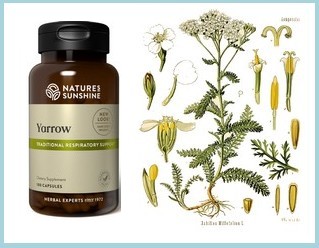
Yarrow
From Steven Horne Nature's Field
Description and Habitat
A perennial herb, yarrowgrows from 5 to 20 inches in height. The leaves
are very finely divided, giving them a lacy, almost “fern-like” appearance.
The top of the rough, angular stem produces a small cluster of daisy-like
flowers, which are usually white, but sometimes white-lavender, pink or
even yellow. It is native to Europe and Asia, but grows all over the world.
Properties and Constituents
The entire plant is aromatic, possessing a pungent, but not unpleasant,
odor. The taste is nasty, both bitter and astringent. Hence, yarrow has a rich
composition, possessing aromatic, bitter, and astringent qualities.
It contains about 0.1 to 1.4% volatile oil. This essential oil has been
investigated for more than 200 years and more than 42 constituents have
been identified. One constituent of the oil is chamazulene, which has been
found to exhibit anti-inflammatory properties.
Yarrow also contains alkaloids which have been reported to have
hypotensive and fever-reducing qualities. The plant also contains tannins,
flavonoids, saponins, sterols, and salicylic acid (natural aspirin). Nutrition
al analysis of Yarrow shows it to be a relatively good source of chromium,
potassium, selenium, vitamins B1 and C.

Specific Uses
Yarrow has a long history of use, going back to the ancient Greeks. In
fact, its scientific name, Achillea, comes from the ancient warrior hero of
the Greeks, Achilles. Achilles is supposed to have used the herb to staunch
(close and help heal) the wounds of his soldiers. Thus, yarrow has long been regarded as an excellent herb for the healing of injuries, both external and
internal. It has a definite styptic action, meaning it helps to arrest bleeding
from minor wounds. It is anti-inflammatory, astringent and healing.
Taken internally, in the form of capsules or tea or decoction, yarrow also
helps to arrest internal bleeding. It is reported to be especially helpful with
bleeding in the lungs, bowels, or urinary tract.
Drinking a warm tea made with yarrow (or taking capsules with warm
water) while sitting in a tub of hot water will help to open the sweat glands
and purify the blood through the skin. This takes pressure off of the kidneys
and helps to remove toxic waste. It also improves circulation.
Yarrow has been helpful in breaking up fibroids in many cases. Matthew Wood, a professional herbalist, has cleared up many cases of uterine fibroids with this herb alone.
This therapy
is a marvelous aid for many acute ailments, such as colds, flu, measles,
smallpox, chickenpox, and the early stages of a fever.
Taken cool (capsules with cool water or a cold decoction), yarrow
stimulates the digestive system. Its bitter taste stimulates appetite, making
it useful for anorexia, weak appetite and poor digestion. It will also help to
arrest diarrhea and gastric irritations.
Taken warm, it will help expel gas from the bowel, thus aiding in colic,
flatulence, and indigestion.
Yarrow has been used for urinary problems, including incontinence,
mucus discharges from the bladder, blood in the urine, irritation and chronic
diseases of the urinary system.
Yarrow is also antispasmodic. The Indians chewed the herb to relieve
toothache.
|